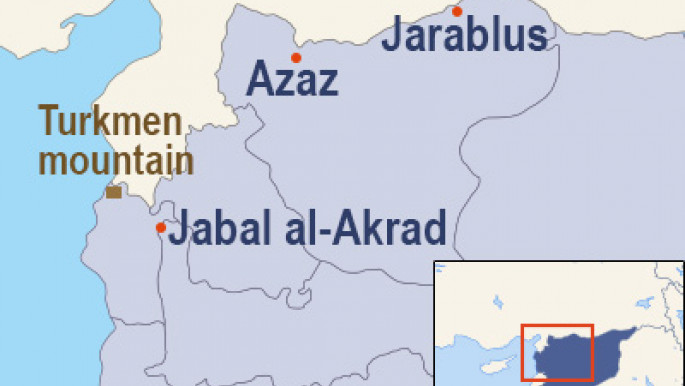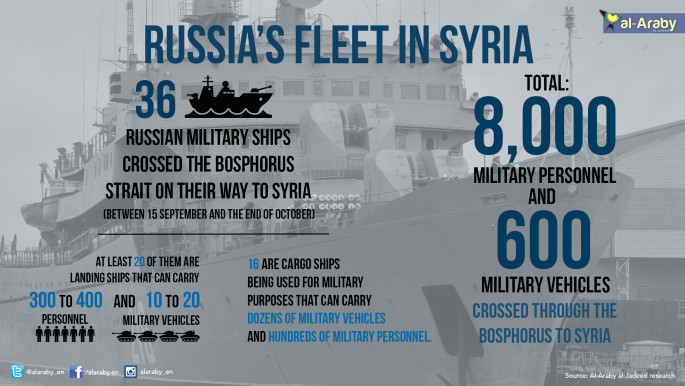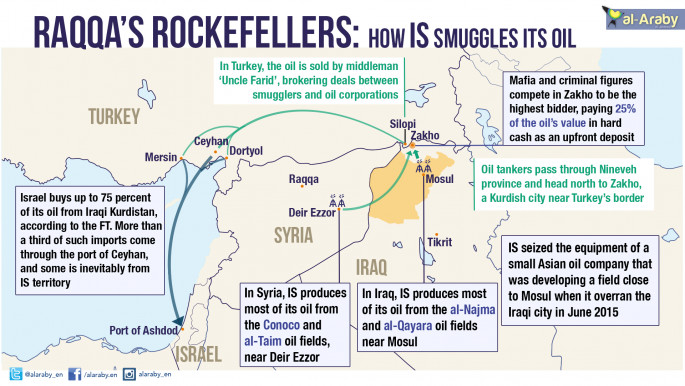Syrian rebels retake strategic hilltop near Turkey from regime
The opposition troops moved to occupy the hilltop a day after it was captured by regime forces under Russian air cover.
The First Coastal Division of the Free Sryain Army, the largest rebel faction in the Latakia countryside, said Jabal Zahia had been "fully liberated" from regime forces and allied militias.
Sources in the area confirmed the reports to al-Araby al-Jadeed. "The [rebel] attack took place in the morning, after the position was shelled with mortars," said Hashem Haj Bakri, activist.
Jabal Zahia is about 1154 metres high, and is located less than 5km from the border with Turkey. It overlooks several Turkmen villages under rebel control.
 |
"The battle in Turkmen Mountain is a fateful one between Turkey and Russia now. Turkey will not allow the regime and the Russians to draw near to its border, especially the Turkemn Mountain, which will definitely be part of the safe zone Turkey is seeking to establish," said Othman Asbro, a former department chief with the regime's Marine and Coastal Artillery and Rockets Branch.
Asbro said that Russia was retaliating against Turkey and its allies in northern Syria by pursuing a "scorched-earth" policy there, citing the relentless Russian bombardment of villages in the Turkmen Mountain area since Tuesday.
Meanwhile, sources in the Islamic Front rebel group said several strategic positions were also retaken in the Jabal al-Akrad (Kurds Mountain) area of Latakia province, following heavy fighting with regime forces.
Kurdish forces attack
Islamist rebel forces, including the Nusra Front, engaged in fighting with Jaysh al-Thuwar, a faction affiliated to the Kurdish People's Protection Units (YPG), in northern Aleppo near Azaz, said Bahaa al-Halabi, an activist in the area.
The fighting was reportedly accompanied by Russian aerial bombardment on rebel positions on the outskirts of villages close to the Syrian-Turkish border.
| Read more on the Russia-Turkey crisis over Syria |
| - NATO calls extraordinary meeting after Turkey downs Russian jet - Russia jet in Turkish airspace 'was not the first' - What was Russia's airforce doing near Turkey's borders anyway? - Who are the Turkmen? |
"The attack by the YPG is a serious test of Turkey's statements regarding establishing a safe zone," speculated Halabi in statements to al-Araby al-Jadeed.
Other activists, meanwhile, said the Kurdish attack on Syrian rebels was a Russian attempt to implicate Kurds in its showdown with Turkey, in the wake of the downing of a Russian jet.
However, the YPG issued a statement condemning "the false rumours that were issued in connection with the [clashes] in the Azaz area between Jaysh al-Thuwar and other factions":
"We reiterate once again that we in the YPG have no ties to the ongoing problems in the countryside of Azaz."
Meanwhile, three were killed and others were injured by mortars fired by Islamic State group fighters near the Kurdish town of Safira in southeast Aleppo, according to the UK-based Syrian Observatory for Human Rights (SOHR).
On Wednesday, the co-leader of the Kurdish Democratic Union Party (PYD) challenged Turkey's plans to establish a safe zone in northern Syria, saying the border region was a historic part of Kurdistan.
In an interview with a Moscow-owned Turkish language station, Saleh Muslim said that Turkey "has no right to intervene" in the region between the Aleppo border towns of Azaz and Jarabulus, which is currently controlled by IS.
|
||
"The percentage of Kurds in the area between Jarablus and Aazaz is over 50 percent," he claimed during his sit-down with Rusya'nin Sesi ["Voice of Russia"] radio.
However, Muslim would not answer if the YPG planned to stage an offensive westward from its current positions toward Jarabuus, a key IS stronghold on the Turkish border.
YPG general commander Sipan Hemo boasted in late August that Kurdish forces would "liberate Jarabulus" - directly challenging Ankara's plans to establish its own Turkey-friendly safe zone in the area.
However, Turkey has shelled Kurdish forces attempting to cross the Euphrates River to conduct raids on IS forces positioned around Jarabulus, enforcing a "red line" forbidding the YPG from entering Ankara's planned "safe zone".
Turkey in late July launched military campaigns against both IS and the seperatist Kurdistan Workers' Party (PKK) in Turkey - an affiliate of the Syrian PYD.
Before the launch of operations, Turkish leaders repeatedly insisted that the expansion of YPG forces in northern Syria posed a threat to the country.
Turkish President Recep Tayyip Erdogan on June 26 warned that his country "would never allow" the establishment of a Kurdish state on its border, setting the stage for reports that Turkey's ground incursion would aim to preempt any further Kurdish advances against IS along the border.
So far, the Turks have focused their military efforts against the PKK, while reportedly training Turkmen and friendly Syrian rebel forces to act as a proxy to battle IS in a zone of territory stretching from north of Aleppo to Jarablus in the west.
Reports have emerged in recent days that Ankara was once again moving forward with plans to establish a safe zone in northern Syria, while Erdogan for his part reiterated Tuesday that his country would "soon realise" a humanitarian zone that would stretch all the way from Jarabulus to the Mediterranean coast.
 |
|
[Click to enlarge] |
'Civilians dead' in fresh Raqqa strikes
Syrian opposition groups say a new wave of airstrikes on the city of Raqqa - the capital of the self-declared "caliphate" - has killed at least eight people, including five children.
It wasn't immediately clear who carried out the airstrikes on Friday.
|
||
The city in northeastern Syria has become the focus of international airstrikes aimed at the group.
A Raqqa-based activist group that reports on IS, known as Raqqa is Being Slaughtered Silently, said that most of the casualties occurred when warplanes targeted the city's Heten School.
The school, like others in Raqqa, has been taken over by IS.
The Syrian Observatory for Human Rights put the death toll at 12, including the five children.
Russia and a US-led coalition that includes France have been pounding Raqqa in recent days.
On Friday, France's foreign minister said destroying IS's Raqqa headquarters was the main objective of the international military campaign.
In an interview with RTL radio, Laurent Fabius said "neutralising and eradicating Daesh" was an objective that all countries agreed upon, referring to IS by its Arabic acronym.
He spoke after a week of intense diplomacy capped by the French president's meeting with Russian President Vladimir Putin.
The Islamic State group has claimed responsibility for the downing of a Russian passenger plane over Egypt, as well as the November 13 attacks in Paris that killed 130 people. Fabius said Putin agreed on the need to focus international efforts against the extremist group, and France is drawing up a map of moderate groups' positions, to protect them from warplanes.
He also said the international coalition was focusing on oil convoys from the group's territory, which provide a crucial source of income. He said some of the trucks head towards Turkey, and France believes Syrian leader Bashar al-Assad is also a buyer.
 |
| IS's oil operation [Click to enlarge] Read more: Raqqa's Rockefellers: How IS smuggles its oil |





 Follow the Middle East's top stories in English at The New Arab on Google News
Follow the Middle East's top stories in English at The New Arab on Google News


